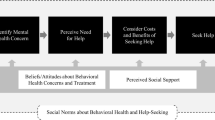Summary
Tavistock group relations conferences were held for mental health trainees and staff in two different settings. Three month follow-up data were collected on the majority of members. The relationship between four sets of predictor variables: staff facilitation of learning; member participation; learning in the conference events; and learning about specific content areas; and four outcome criteria: overall learning; emotional impact; desire to attend another conference; and recommending such training to a friend were studied. As expected, in both conferences, staff facilitation, learning about specific content, and learning in conference events were all significantly positively related to members' perception of their own learning, emotional impact, desire to attend another conference, and recommendation of such training to a friend. The unanticipated finding that member participation in the conference is not related to any outcome criteria is discussed in terms of design and the nature of learning in group relations conferences. In Tavistock groups the emphasis on unconscious processes engages members both cognitively and emotionally but may lead to a lack of direct participation without a loss in learning.
Similar content being viewed by others
References
Redlich FC, Astrachan BM (1975) Group dynamics training. In: Coleman AD, Bexton WH (eds) The group relations reader. Grex, Sausolito, CA, pp 225–231
Kernberg OF (1975) Modern hospital milieu treatment of schizophrenia. In: Arieti S, Chrzanowski G (eds) New dimensions in psychiatry: a world view. John Wiley, New York
Cooper L (1971) Systemtatic use of groups in acute psychiatric units. Group Anal 4: 152–156
U. S. Government Printing Office (1978) Report to the President: The commission on mental health
Almond R, Astrachan BM (1969) Social systems training for psychiatric residents. Psychiatry 32: 277–291
Astrachan BM, Redlich FC (1969) The effect of leadership ambiguity on resident behavior in study groups. Int J Group Psychother 19: 487–494
O'Connor G (1971) The Tavistock method of group study. Sci Psychoanal 18: 110–115
Redlich FC, Astrachan BM (1969) Group dynamics training. Am J Psychiatry 125: 55–61
Gustafson J, Hausman W (1975) The phenomena of splitting in a small psychiatric organization: A case report. Soc Psychiatry 10: 199–203
Rioch MJ, Coulter WR, Wienberger DM (1976) Dialogues for therapists. Jossey-Bass, San Francisco
Shapiro RL (1971) The study group as training for group psychotherapists. Paper presented at the American Group Psychotherapy Association, Los Angeles, CA
Stone WN, Green BL (1978) Learning during group therapy leadership training. Small Group Behav 9: 373–386
Rice AK (1965) Learning for leadership. Tavistock, London
Segal H (1964) Introduction to the work of Melanie Klein. Basic Books, New York
Bion WH (1959) Experiences in groups. Basic Books, New York
Miller EJ, Rice AK (1969) Systems of organization. Tavistock, London
Miller EJ (1979) Open systems revisited: a proposition about development and change. In: Lawrence WG (ed) Exploring individual and organizational boundaries. John Wiley, New York, pp 217–234
Gwynne J (1972) A life apart. Tavistock, London
Newton PN (1973) Social structure and process in psychotherapy: a sociopsychological analysis of transference, resistance and change. Int J Psychiatry 11: 480–512
Singer DL, Astrachan BM, Gould LJ, Klein EB (1975) Boundary management in psychological work with groups. J Appl Behav Sci 11: 137–176
Lawrence WG (1979) Exploring individual and organizational boundaries. John Wiley, New York, pp 235–250
Singer DL et al (see Ref. 20)( p 144
Bunker DR (1965) Individual application of laboratory training. J Appl Behav Sci 1: 131–148
Mills TM (1965) Group transformation. Prentice Hall, Englewood Cliffs, NJ
Joseph DI, Klein EB, Astrachan BM (1975) Responses of mental health trainees to a group relations conference: Understanding from a systems perspective. Soc Psychiatry: 10: 79–85
Singer DL et al (see Ref. 20)( p 147
Lennung SA, Ahlberg A (1975) The effects of laboratory training: a field experiment. J Appl Behav Sci 11: 177–186
Palmer B (1975) Learning and the group experience. In: Lawrence WG (ed) Exploring individual and organizational boundaries. John Wiley, New York, pp 169–192
Lennung SA, Ahlberg A (see Ref. 27)( p 186
Bunker DR, Knowles ES (1967) Comparison of behavioral changes resulting from human relations training laboratories of different lengths. J Appl Behav Sci 3: 505–523
Palmer B (see Ref. 28)( pp 174–176
Rioch MJ (1978) Why I work as a consultant in the conferences of the A. K. Rice Institute. J Pers Soc Systems 1: 31–50
Author information
Authors and Affiliations
Additional information
We would like to acknowledge the contributions of Betty Asher, Earl Braxton, Ronald Boyer, Dawnetta Fields, Janet Greenwood and William Hausman.
Rights and permissions
About this article
Cite this article
Correa, M.E., Klein, E.B., Howe, S.R. et al. A bridge between training and practice: Mental health professionals' learning in group relations conferences. Soc Psychiatry 16, 137–142 (1981). https://doi.org/10.1007/BF00582673
Accepted:
Issue Date:
DOI: https://doi.org/10.1007/BF00582673




